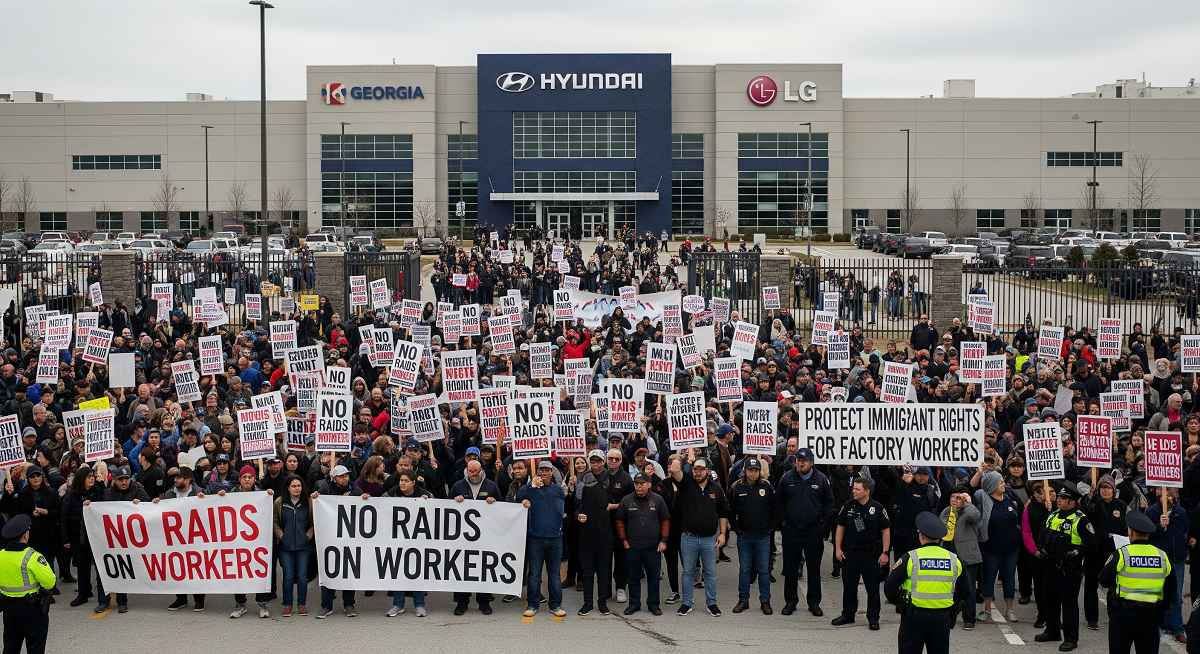Breaking Update: Over 300 South Korean Workers Deported After Georgia Hyundai ICE Raid
In a significant immigration enforcement operation, U.S. authorities detained approximately 475 workers at Hyundai’s electric vehicle battery plant under construction in Ellabell, Georgia, on September 4, 2025. The majority of those detained were South Korean nationals, many of whom were later deported back to South Korea, igniting diplomatic tensions and widespread protests.
Raid Details and Worker Deportations
The U.S. Immigration and Customs Enforcement (ICE) raid targeted workers who had entered the U.S. on business or visa waiver permits but were allegedly engaged in employment activities. Among those detained, 316 were South Korean nationals. Following their detention, a chartered flight departed from Atlanta on September 11, carrying the deported workers back to Incheon International Airport in South Korea on September 12. Upon arrival, they were met with support from families and officials, including Vice Foreign Minister Park Yoonjoo and LG Energy Solution’s president.
Diplomatic Fallout and South Korean Response
The deportations have strained U.S.-South Korea relations. South Korean President Lee Jae Myung expressed concern over the incident, suggesting that Korean businesses might hesitate to invest in the U.S. without clearer visa policies. The South Korean government has called for improvements in the U.S. visa system, particularly for workers traveling to the U.S. for business-related activities.
South Korea’s Foreign Minister Cho Hyun announced plans to establish a visa desk at the U.S. Embassy in Seoul to address visa issues for South Korean business personnel. Additionally, both countries have agreed to form a joint working group to resolve visa challenges and improve procedures for Korean business personnel in the U.S.
Workplace Safety Concerns and Impact on Hyundai’s Operations
The raid has also brought attention to workplace safety issues at the Hyundai plant. The construction site had reported three fatal accidents and 91 ambulance calls over a two-year period, raising questions about whether undocumented workers were reluctant to report safety violations. While both Hyundai and LG Energy Solution have stated their commitment to safety and legality, the incident has underscored the need for improved safety protocols and transparency in reporting workplace incidents.
The deportations are expected to delay the plant’s construction by two to three months, potentially impacting Hyundai’s production timelines and future investments in the U.S.
Broader Implications for U.S. Immigration Policy and Foreign Investment
The Georgia ICE raid and subsequent deportations highlight ongoing challenges in U.S. immigration policy, particularly concerning foreign workers employed at large industrial sites. The incident has prompted discussions about the need for clearer visa policies and better coordination between U.S. immigration authorities and foreign companies operating in the U.S.
The deportations have also raised concerns among other foreign companies about the stability of the U.S. investment environment. The incident serves as a reminder of the complexities involved in balancing immigration enforcement with the needs of foreign businesses and their workers.
FAQs
A1: Over 300 South Korean workers were detained during the raid, and the majority were deported back to South Korea.
A2: The raid targeted workers who had entered the U.S. on business or visa waiver permits but were allegedly engaged in employment activities.
A3: South Korea has expressed concern over the incident, calling for improvements in the U.S. visa system and establishing a visa desk at the U.S. Embassy in Seoul to address visa issues for South Korean business personnel.
Source: The Guardian









